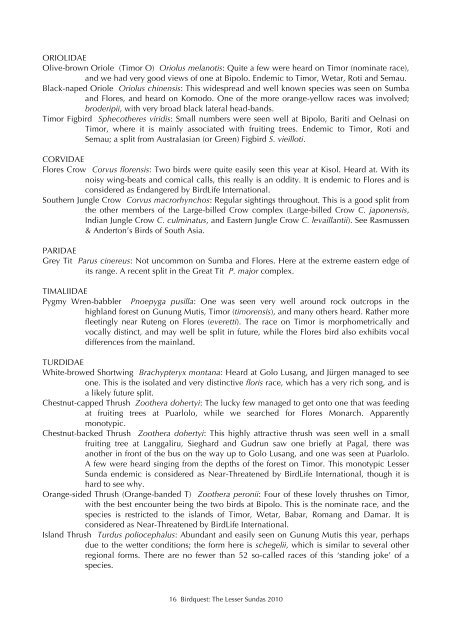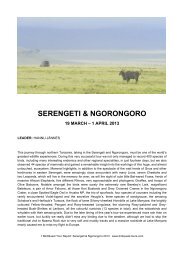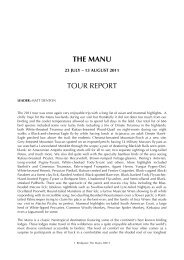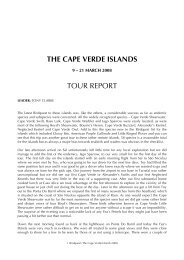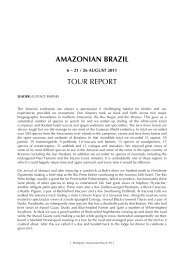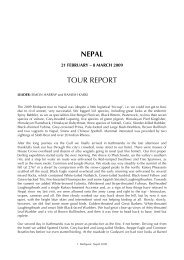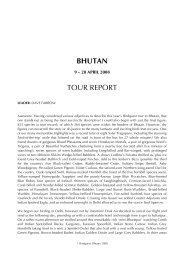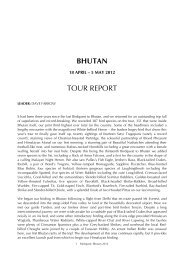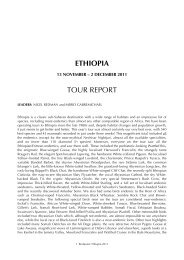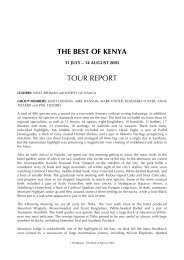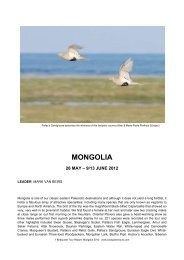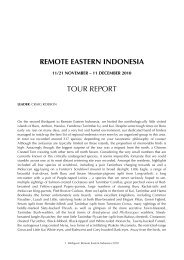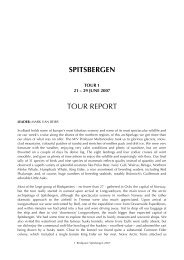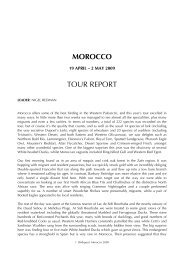INDONESIA (LESSER SUNDAS) REP 10 - Birdquest
INDONESIA (LESSER SUNDAS) REP 10 - Birdquest
INDONESIA (LESSER SUNDAS) REP 10 - Birdquest
Create successful ePaper yourself
Turn your PDF publications into a flip-book with our unique Google optimized e-Paper software.
ORIOLIDAE<br />
Olive-brown Oriole (Timor O) Oriolus melanotis: Quite a few were heard on Timor (nominate race),<br />
and we had very good views of one at Bipolo. Endemic to Timor, Wetar, Roti and Semau.<br />
Black-naped Oriole Oriolus chinensis: This widespread and well known species was seen on Sumba<br />
and Flores, and heard on Komodo. One of the more orange-yellow races was involved;<br />
broderipii, with very broad black lateral head-bands.<br />
Timor Figbird Sphecotheres viridis: Small numbers were seen well at Bipolo, Bariti and Oelnasi on<br />
Timor, where it is mainly associated with fruiting trees. Endemic to Timor, Roti and<br />
Semau; a split from Australasian (or Green) Figbird S. vieilloti.<br />
CORVIDAE<br />
Flores Crow Corvus florensis: Two birds were quite easily seen this year at Kisol. Heard at. With its<br />
noisy wing-beats and comical calls, this really is an oddity. It is endemic to Flores and is<br />
considered as Endangered by BirdLife International.<br />
Southern Jungle Crow Corvus macrorhynchos: Regular sightings throughout. This is a good split from<br />
the other members of the Large-billed Crow complex (Large-billed Crow C. japonensis,<br />
Indian Jungle Crow C. culminatus, and Eastern Jungle Crow C. levaillantii). See Rasmussen<br />
& Anderton’s Birds of South Asia.<br />
PARIDAE<br />
Grey Tit Parus cinereus: Not uncommon on Sumba and Flores. Here at the extreme eastern edge of<br />
its range. A recent split in the Great Tit P. major complex.<br />
TIMALIIDAE<br />
Pygmy Wren-babbler Pnoepyga pusilla: One was seen very well around rock outcrops in the<br />
highland forest on Gunung Mutis, Timor (timorensis), and many others heard. Rather more<br />
fleetingly near Ruteng on Flores (everetti). The race on Timor is morphometrically and<br />
vocally distinct, and may well be split in future, while the Flores bird also exhibits vocal<br />
differences from the mainland.<br />
TURDIDAE<br />
White-browed Shortwing Brachypteryx montana: Heard at Golo Lusang, and Jürgen managed to see<br />
one. This is the isolated and very distinctive floris race, which has a very rich song, and is<br />
a likely future split.<br />
Chestnut-capped Thrush Zoothera dohertyi: The lucky few managed to get onto one that was feeding<br />
at fruiting trees at Puarlolo, while we searched for Flores Monarch. Apparently<br />
monotypic.<br />
Chestnut-backed Thrush Zoothera dohertyi: This highly attractive thrush was seen well in a small<br />
fruiting tree at Langgaliru, Sieghard and Gudrun saw one briefly at Pagal, there was<br />
another in front of the bus on the way up to Golo Lusang, and one was seen at Puarlolo.<br />
A few were heard singing from the depths of the forest on Timor. This monotypic Lesser<br />
Sunda endemic is considered as Near-Threatened by BirdLife International, though it is<br />
hard to see why.<br />
Orange-sided Thrush (Orange-banded T) Zoothera peronii: Four of these lovely thrushes on Timor,<br />
with the best encounter being the two birds at Bipolo. This is the nominate race, and the<br />
species is restricted to the islands of Timor, Wetar, Babar, Romang and Damar. It is<br />
considered as Near-Threatened by BirdLife International.<br />
Island Thrush Turdus poliocephalus: Abundant and easily seen on Gunung Mutis this year, perhaps<br />
due to the wetter conditions; the form here is schegelii, which is similar to several other<br />
regional forms. There are no fewer than 52 so-called races of this ‘standing joke’ of a<br />
species.<br />
16 <strong>Birdquest</strong>: The Lesser Sundas 20<strong>10</strong>


